Announcements

Design and Assessment of a Novel Approach for Ecosystem Warming Experiments in High-Energy Tidal Wetlands
October 30th, 2023
Roy Rich published a paper on the MERIT experiment in JGR: Biogeoscience! Nice work Roy!
"The Marsh Ecosystem Response to Increased Temperatures (MERIT) experiment was established in 2018 on the North Sea coast of Germany. Experimental plots are evenly distributed over three elevational marsh zones (pioneer, low marsh, and high marsh) and include three temperature treatments (ambient, +1.5°C, +3.0°C). MERIT's novel design combines active warming (horizontal surface warming cables and vertical soil warming pins) with passive, partially covered domes. The combination of passive aboveground warming with feedback-controlled active surface and belowground heating provides a setup for understanding warming effects on tidal ecosystems without altering the natural impacts of wind, radiation, and tidal inundations at high-energy coastlines. Our design creates opportunities to expand future warming experiments to remote locations and technically challenging environments."
Roy L. Rich, Peter Mueller, Miriam Fuß, Salomé Gonçalves, Eva Ostertag, Svenja Reents, Hao Tang, Allegra Tashjian, Simon Thomsen, Lars Kutzbach, Kai Jensen, Stefanie Nolte
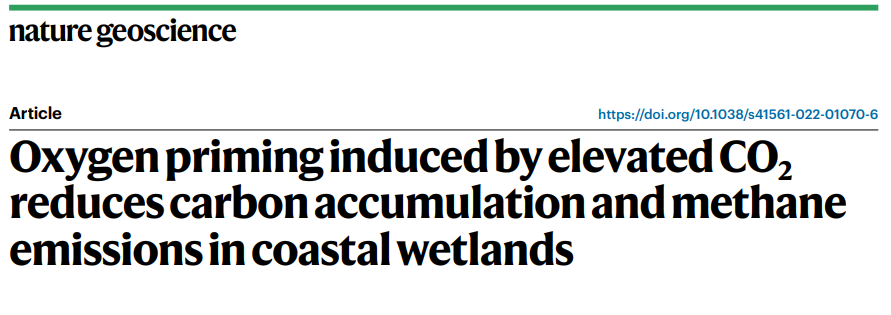
Oxygen priming induced by elevated CO2 reduced carbon accumulation and methane emission in coastal wetlands
January 5, 2023
Genevieve published a paper in Nature Geoscience on the SMARTX elevated CO2 and warming experiment!
"Warming temperatures and elevated CO2 are inextricably linked global change phenomena, but they are rarely manipulated together in field experiments. As a result, ecosystem-level responses to these interacting facets of global change remain poorly understood. Here we report on a four-year field manipulation of warming and elevated CO2 in a coastal wetland. Contrary to our expectations, elevated CO2 combined with warming reduced the rate of carbon accumulation due to increases in plant-mediated oxygen flux that stimulated aerobic decomposition via oxygen priming. Evidence supporting this interpretation includes an increase in soil redox potential and a decrease in the nominal oxidation state of the dissolved organic carbon pool. While warming alone stimulated methane (CH4) emissions, we found that elevated CO2 combined with warming reduced net CH4 flux due to plant–microbe feedbacks. Together, these results demonstrate that ecosystem responses to interacting facets of global change are mediated by plant traits that regulate the redox state of the soil environment. Thus, plant responses are critical for predicting future ecosystem survival and climate feedbacks."
Genevieve L. Noyce, Alexander J. Smith, Matthew L. Kirwan, Roy L. Rich & J. Patrick Megonigal

Even modest climate change may lead to major transitions in boreal forests
August 10, 2022
Roy published a paper in Nature on the impacts of warming in southern boreal forests!
“The sensitivity of forests to near-term warming and associated precipitation shifts remains uncertain. Herein, using a 5-year open-air experiment in southern boreal forest, we show divergent responses to modest climate alteration among juveniles of nine co-occurring North American tree species.”
Reich, P.B., Bermudez, R., Montgomery, R.A., Rich, R.L., Rice, K.E., Hobbie, S.E., and Stefanski, A. (2022).

Considering coasts: Adapting terrestrial models to characterize coastal wetland ecosystems
June 15, 2021
Genevieve, Roy, and Pat published modified E3SM models to mimic tidal marsh dynamics and SMARTX findings in Ecological Modeling!
“The Energy Exascale Earth System Model (E3SM) simulates fully coupled processes and interactions among water, energy, carbon and nutrient cycles. E3SM connects vegetation and soil dynamics through nutrient uptake, plant production, litterfall and decomposition as a function of abiotic parameters (e.g. temperature and moisture). However, E3SM is designed to characterize terrestrial ecosystems and connects land and open ocean systems using a single streamflow transport term, ignoring the complex dynamics of energy, water, carbon, and nutrients in coastal systems. The goals of our project were to: (1) Parameterize a point version of E3SM to capture coastal wetland habitats and (2) Determine marsh community responses to increased temperature and elevated CO2.”
O’Meara, T.A., Thornton, P.E., Ricciuto, D.M.,Noyce, G. L., Rich, R.L., and Megonigal, J. P. (2021).

Biogeochemical and plant trait mechanisms drive enhanced methane emissions in response to whole-ecosystem warming
April 19, 2021
Genevieve and Pat published findings from SMARTX in Biogeosciences!
“Climate warming perturbs ecosystem carbon (C) cycling, causing both positive and negative feedbacks on greenhouse gas emissions. In 2016, we began a tidal marsh field experiment in two vegetation communities to investigate the mechanisms by which whole-ecosystem warming alters C gain, via plant-driven sequestration in soils, and C loss, primarily via methane (CH4) emissions. Here, we report the results from the first 4 years.”
Noyce, G. L. and Megonigal, J. P. (2021).
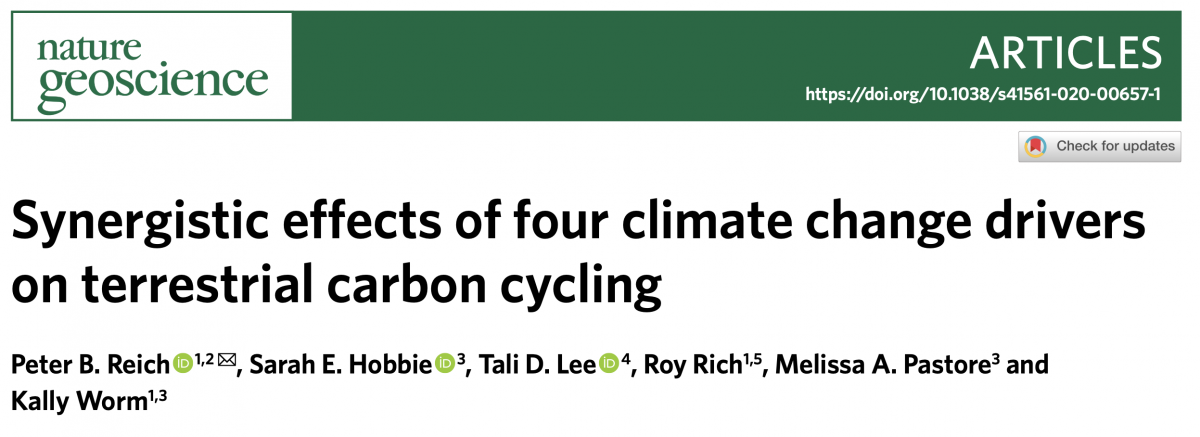
Synergistic effects of four climate change drivers on terrestrial carbon cycling
November 23, 2020
Roy published a paper in Nature Geoscience with TeRaCON collaborators!
"Disentangling impacts of multiple global changes on terrestrial carbon cycling is important, both in its own right and because such impacts can dampen or accelerate increases in atmospheric CO2 concentration. Here we report on an eight-year grassland experiment, TeRaCON, in Minnesota, United States, that factorially manipulated four drivers: temperature, rainfall, CO2 and nitrogen deposition.”
Reich, P. B., Hobbie, S. E., Lee, T. D., Rich, R., Pastore, M. A., & Worm, K. (2020).
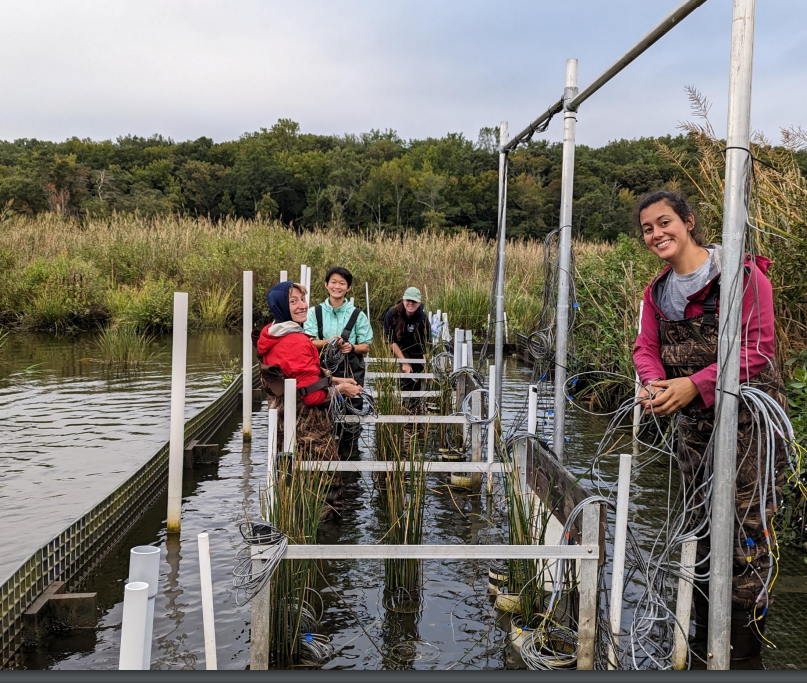
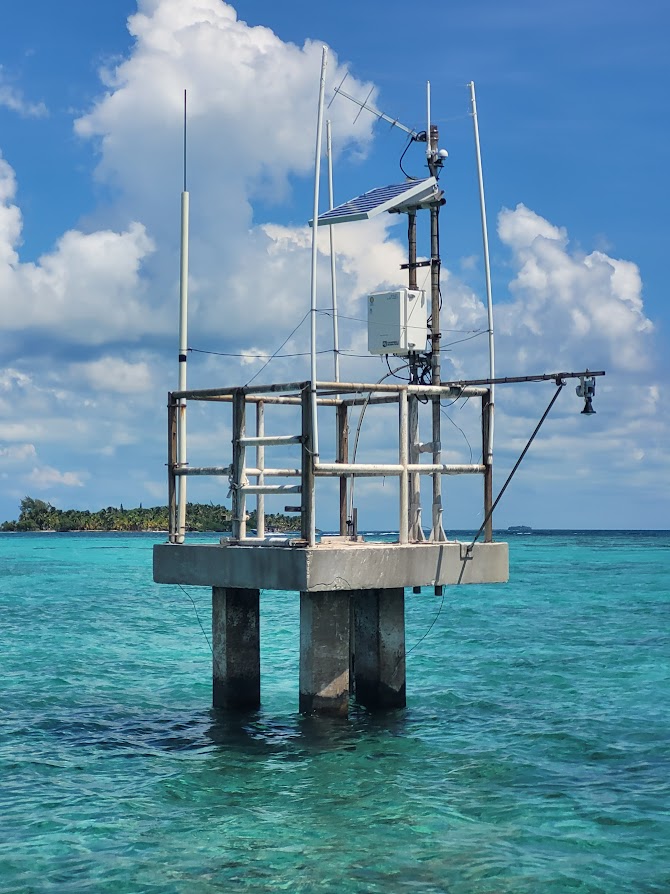
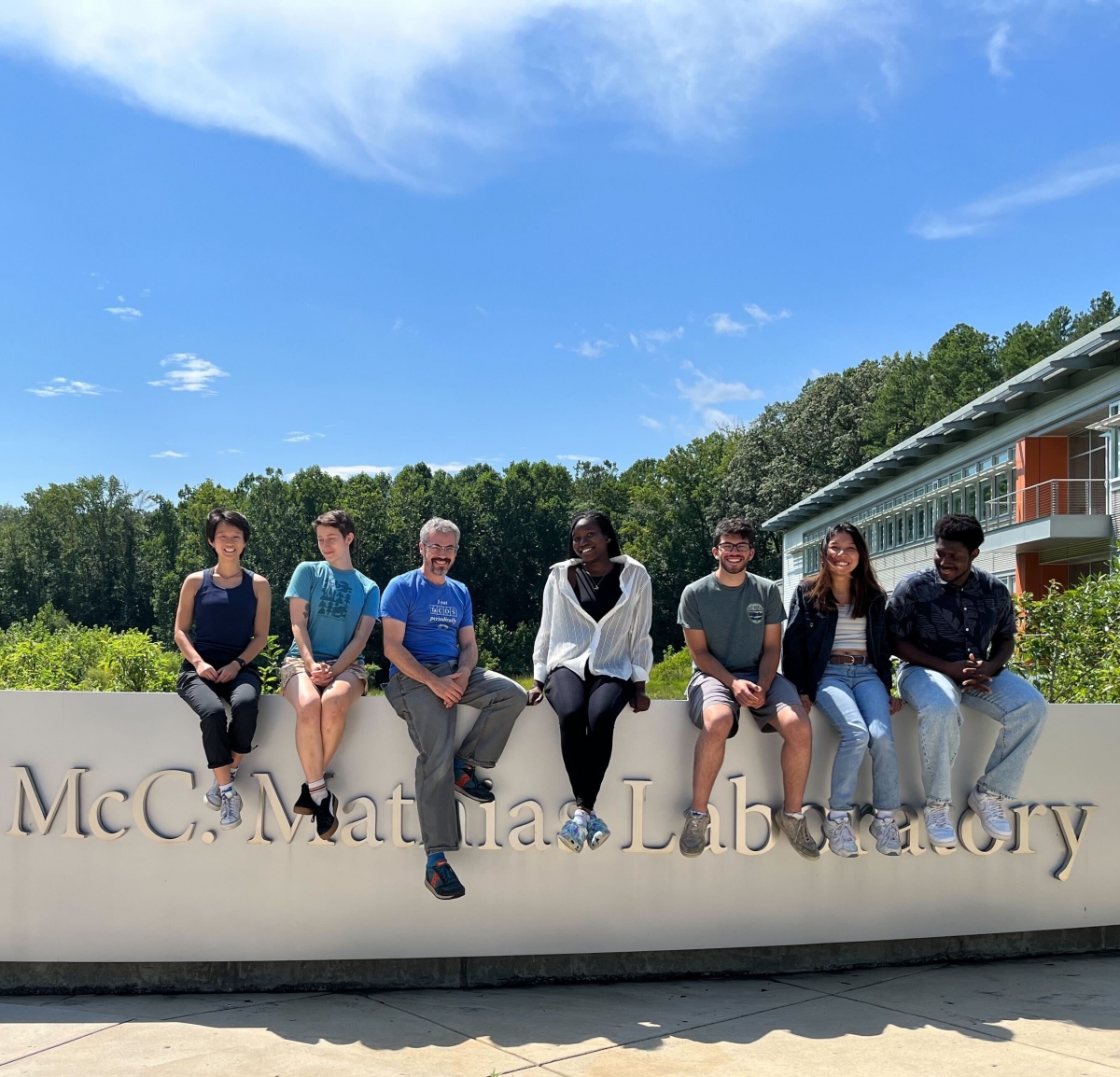
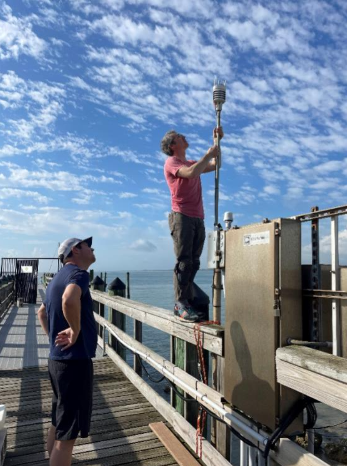
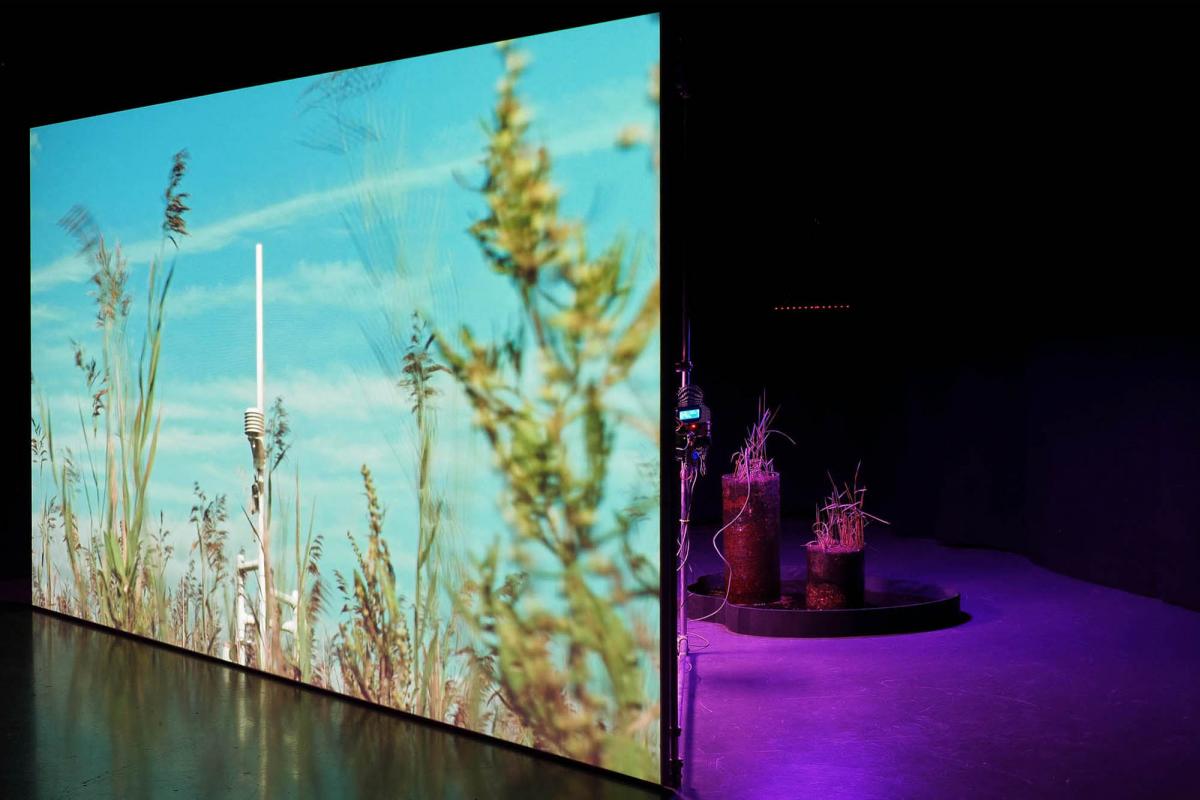
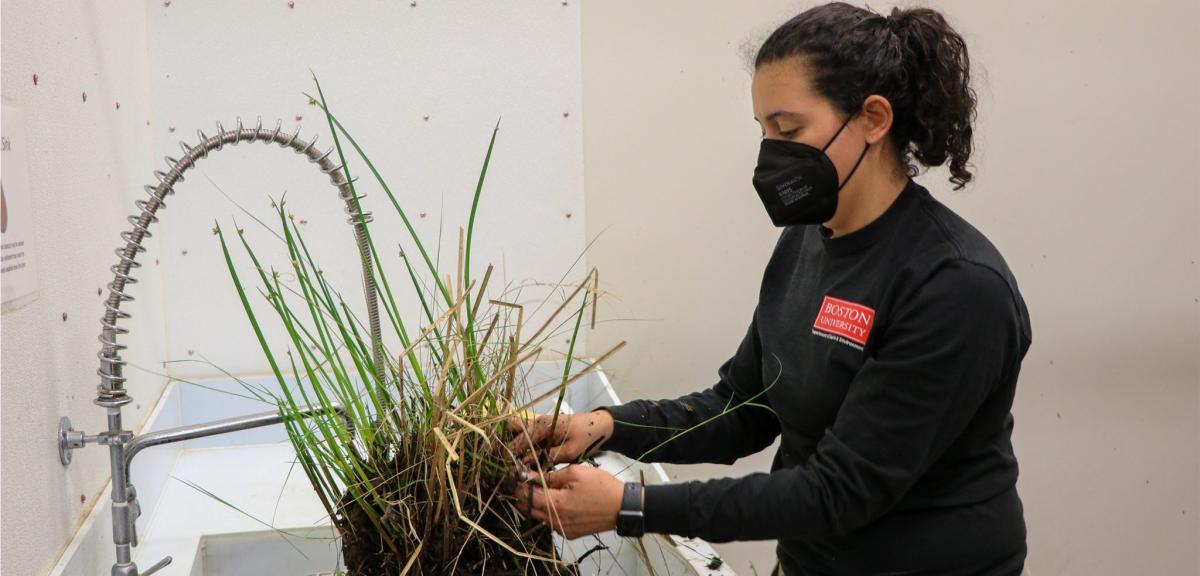
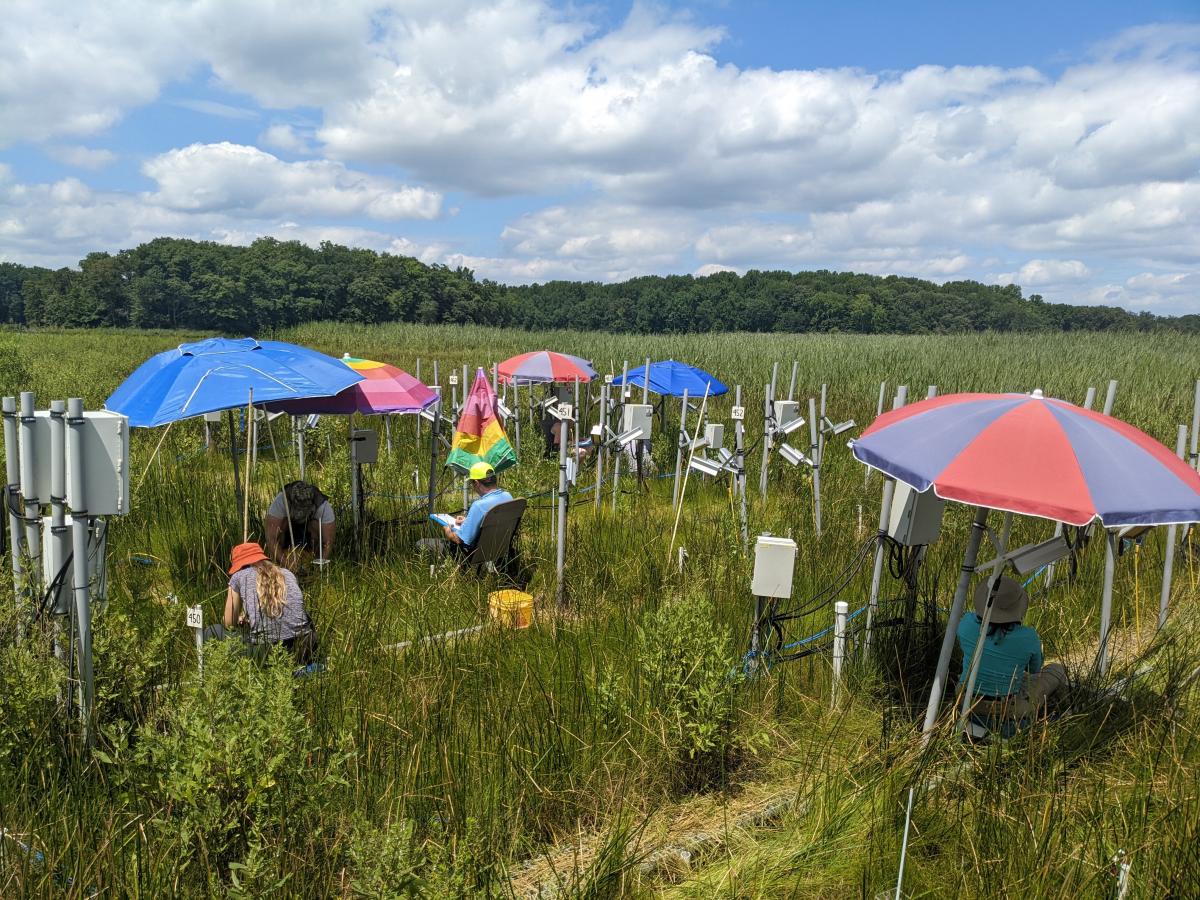
October 10, 2023
Alia Al-Haj successfully orchestrated the take-down of the marsh organs, which she has been running an experiment in for the last two growing seasons, just in time for her new experiment to be built. Alia will spend the next three years running GENX-2, a mesocosm experiment designed to investigate "hot moments" of green-house gas emissions from coastal wetlands. Good luck, Alia!!
Photo: Genevieve Noyce
September 21, 2023
Roy and Selina traveled to Carrie Bow Cay, Belize, this September and completed a big overhaul of the weather and water quality monitoring system. With help from SERC's own Gary Peresta and Smithsonian Marine Station's Dave Branson, they successfully installed several new instruments and brought Carrie Bow data onto SERC's real-time logging network. Carrie Bow also serves as a partner site with MarineGEO's Chemical and Physical Observations Program, providing environmental data to supplement the numerous biological experiments that occur at the Carrie Bow research center.
Photo: Roy Rich
August 11, 2023
The TE Lab hosted four interns for the summer of 2023 to work on projects for the SMARTX, GENX, and PathFinder experiments. Jacob Brotman-Krass developed a DIY redox sensing system, Olukorede Agboola designed a new lid for flux autochambers, Ashley Tadjukem improved our CO2 sensing capacity by creating a printed circuit board, and Regina Nguyen created a feedback controlled gas delivery system. Great work, guys!!
Photo: Henry Betts
April 28, 2023
Roy Rich, Selina Cheng, Dean Janiak, and Dave Branson installed a new weather station and upgraded the water level instrumentation at the Florida Smithsonian Marine Station. This update was made very urgent when the site was struck by lightning in 2022! The environmental data are being logged in real-time and online will be viewable and downloadable through the MarineGEO CPOP dashboard on the new MGEO website
Photo: Selina Cheng
March 21, 2023
Former Smithsonian Artist Research Fellow Elise Eeraerts and Roberto Aparicio Ronda opened their video installation Like snakes, the roots of trees, Coil themselves from rock and sand. This work was created in collaboration with the Technology and Ecology lab, and explores the intersection of fable and fact in wetlands.
Photo: Joeri Thiry STUK
January 18, 2023
SERC Post-doc Alia Al-Haj is featured in the Hakai Magazine article Salt Marsh Microbes Threaten to Reshape the Atmosphere. She explains her Marsh Organ experiment, and the importance of smelling salt marshes!
Photo: Christian Elliott
August 5, 2022
A successful 2022 GCREW census! The Biogeochemistry and TE lab technicians, interns, and volunteers all worked together over a two-week period to count, measure, and clip thousands of stems in our annual census.
Photo: Genevieve Noyce
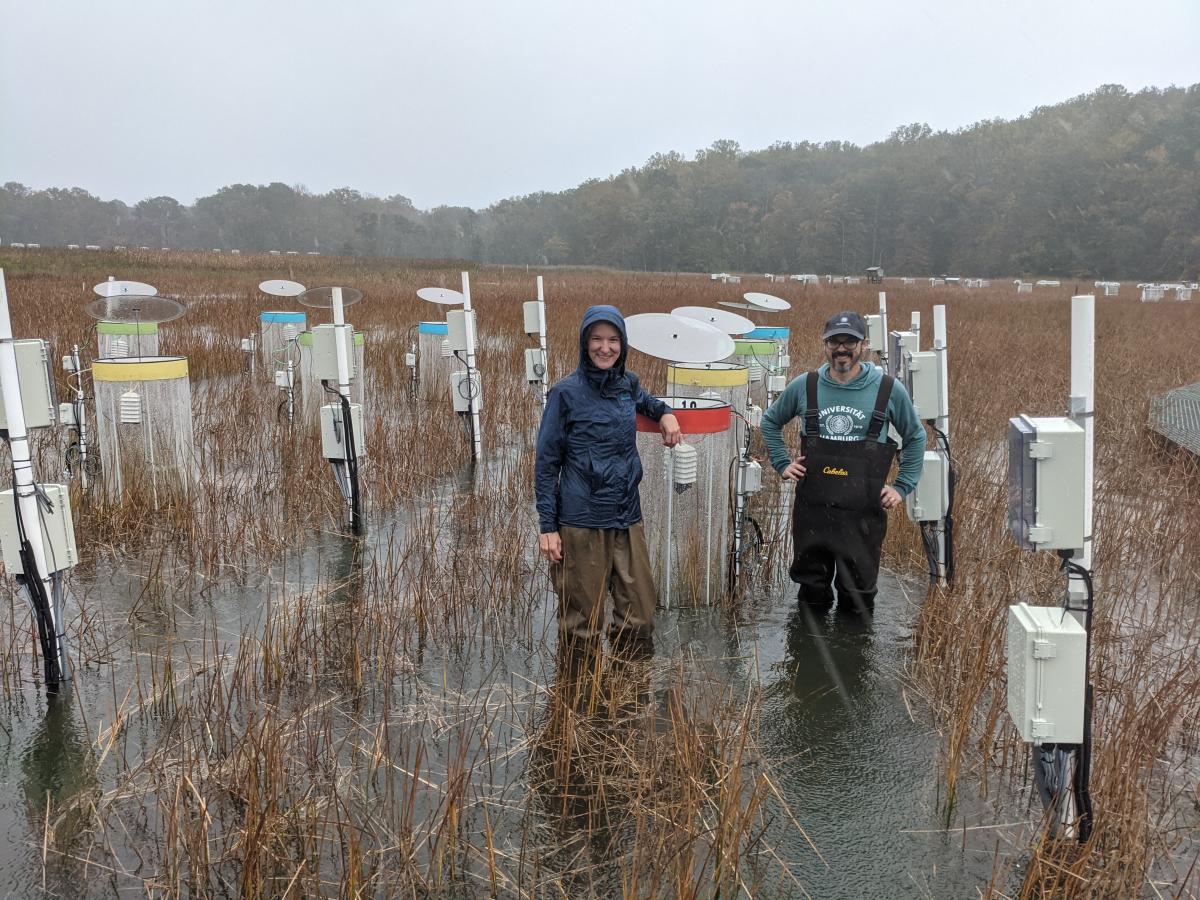
October 29, 2021
GCREW experienced record high tides!
Photo: Genevieve Noyce
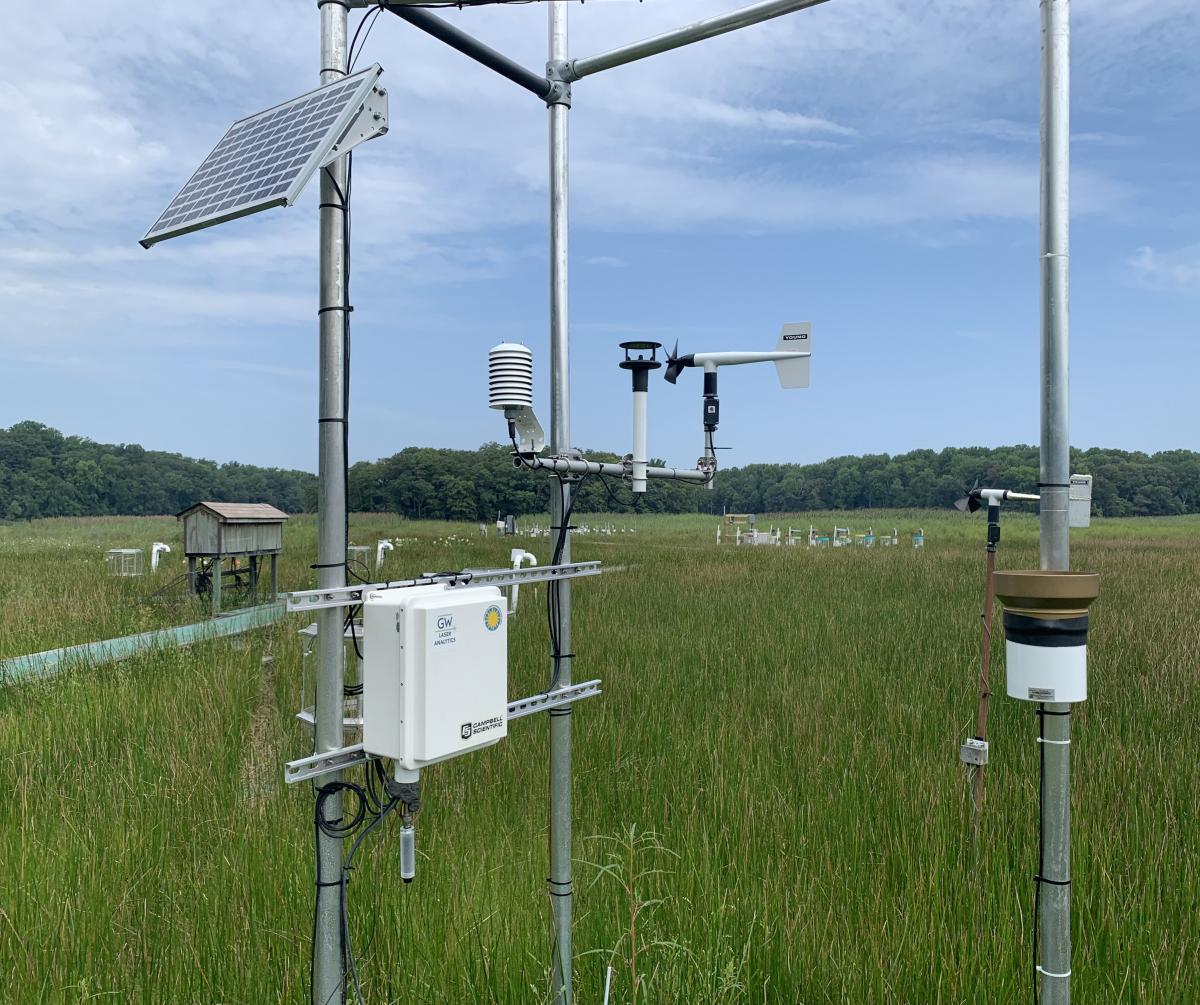
August 13, 2021
The TE Lab has deployed a new weather station at the Global Change Research Wetland! The station uses multiple instruments to collect MET, water level, and soil data every 15 minutes.
Photo: Leona Neftaliem
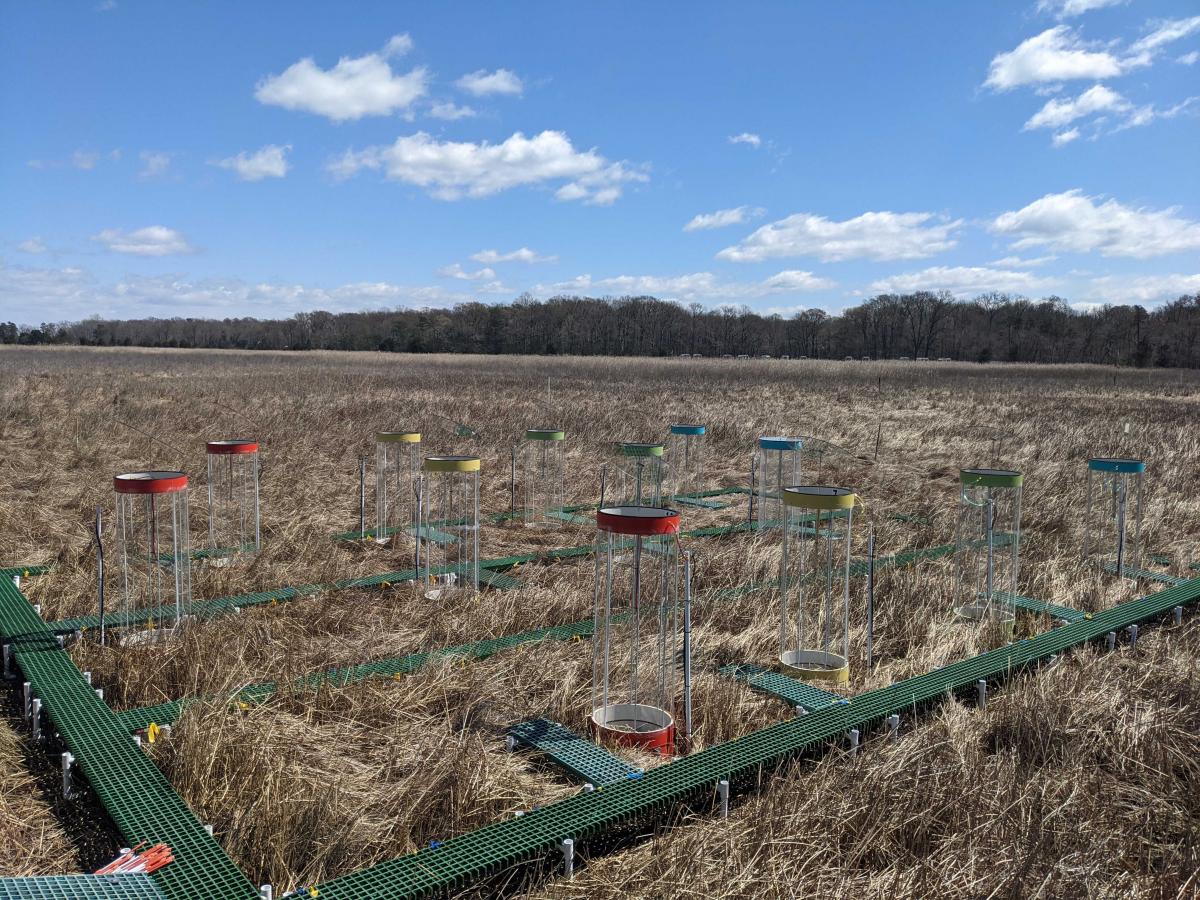
April 2, 2021
Automated methane chambers designed by Roy and Genevieve have become the newest addition to the Global Change Research Wetland! Twelve methane chambers were deployed as a part of GENX to capture methane data at short time scales, including methane changes in response to precipitation, tidal cycles, and other weather events.
Photo: Genevieve Noyce
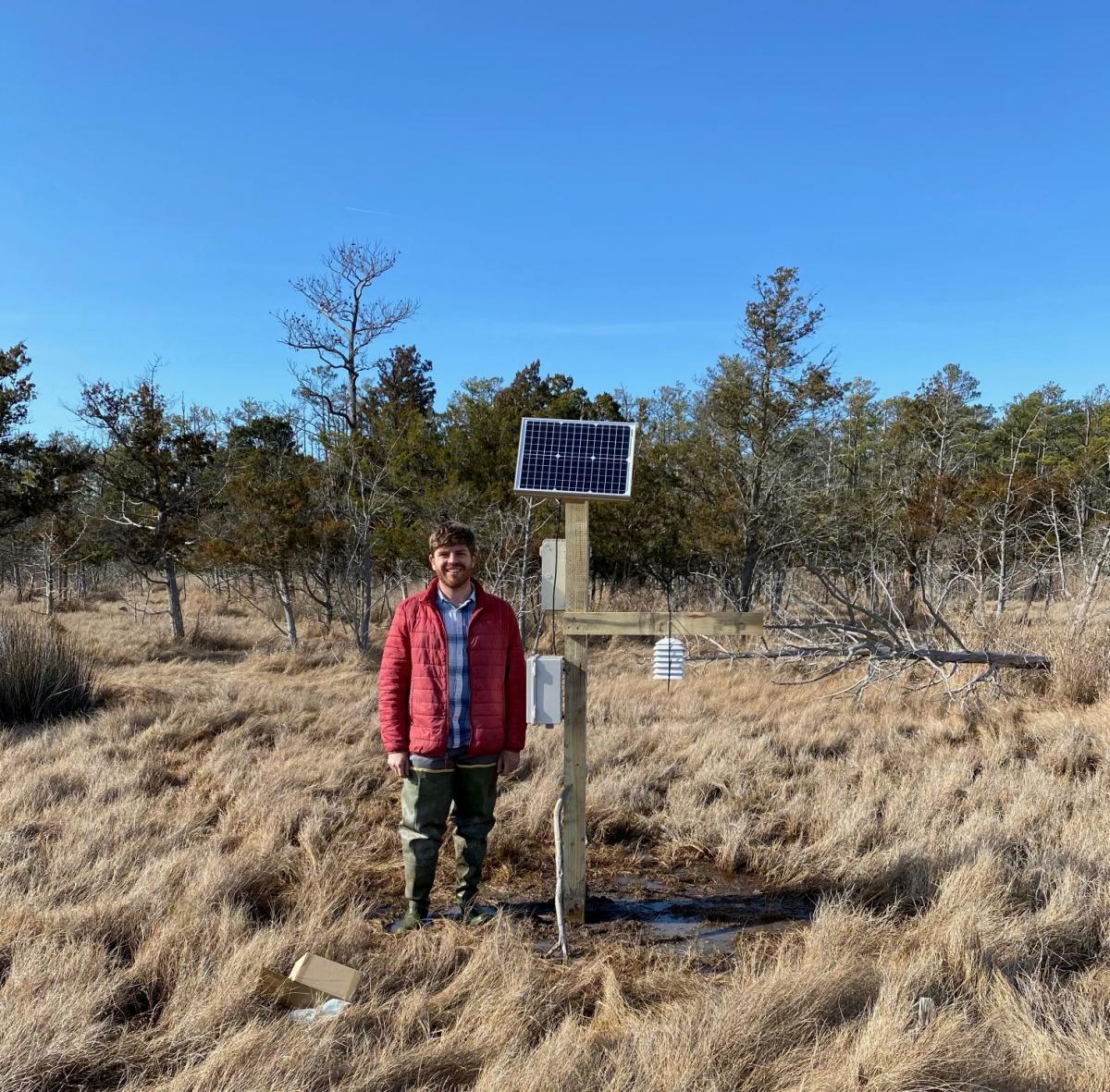
March 5, 2021
Marc deployed a pilot experiment at the Virginia Coast Reserve using our CO2 sensors! Marc will be deploying 24 more sensors on the Eastern shore of Virginia to capture CO2 dynamics at a rapidly changing terrestrial-aquatic interface.
Photo: Marc Rosenfield
Technology in Ecology / Watershed Science Data Technician
Application Period: October 15, 2023 - November 15, 2023
Salary: SI-grade 5, 6, or 7; $42,0147 - $53,105 per year depending on experience.
Overview: Full posting can be found at https://serc.si.edu/get-involved/job-opportunities/data-technician-techn...
This hire is for a joint position between Technology in Ecology Lab and the SERC Watershed Science Lab to help integrate watershed monitoring into SERC’s real time networks and create data workflows that implement automation into stream monitoring protocols.
At SERC, the Technology in Ecology Lab collaborates extensively to design and support technological innovation and production to serve ecological research, experimental design, and data infrastructure We develop and support several ongoing climate change experiments such as SMARTX, GENX, and MERIT, and maintain sensor and data infrastructure for the MarineGEO chemical and physical observations program as well as COMPASS. We operate at the interface of ecology, engineering, and data programming.
The SERC Watershed Science Lab conducts research on the ecosystem ecology and biogeochemistry of watersheds and stream networks. We are especially interested in understanding how land use and land management interact with climate to affect stream network functioning with respect to organic carbon and nutrient transformations and fluxes. This particular position will support the transition of a 50-year old watershed monitoring project to a sensor-based program.
